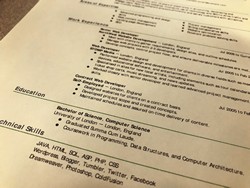Since the introduction of instant messaging to society, whether it was internet chatrooms, emails, or texting, people have started to condense, modify, and alter words in order to make them easier to type. LOL, JK, TTYL, etc. have dominated the digital word since they were created. But despite the ease and comfort in typing these casual words, the consequences on formality and sentence structure could be disastrous.
It’s not even text-talk that’s the problem: informal phrases such as “like,” “legit” and improper use of “literally” surround a generation of people who may not be able to speak in a formal setting, much less speak publicly. But is it necessary to adhere to previously established “rules” of speaking? Or are we meant to go with the flow and treat this like any other “popular phrase” of the past? Does virtual messaging really make these any worse than those that came before?
“It’s more of a subconscious thing people say when they talk,” said Hunter Farman, a sophomore commuication major. It’s true that people don’t use these colloquialisms entirely consciously. These phrases get so ingrained to our day-to-day lives, whether we’re saying them or someone else is, that it becomes hard not to use them.
“There are some people who just use them way too many times when they’re speaking,” continued Farman.
This is true, people go into excess with words that create an easy sentence structure. This combination of repetitive exposure and ease of use makes these phrases crop up everywhere we hear. The common occurrence of these words ingrain them to convention.
Now it’s easy for a group of people to act all high and mighty while criticizing people for their bad grammar, but it’s pointless (that’s what the internet is for.) It’s entirely possible people are overreacting to the matter at hand. There are always two sides to a story, so on the other side of the spectrum, are these informal words really harming the language as a whole?
“Actually, it’s fun using words that don’t actually exist and phrases that really don’t make sense,” said Sabrina Kvalo, a sophomore psychology major.
“It makes conversation way more interesting,” she added.
The thought of using words because they are enjoyable may, at first, seem childish but invokes a feeling of freedom that may have even been apparent when words we use today were created many years ago.
If we think back to Shakespeare, he may very well have created a word because it was “fun to use” in that particular scene. It is a worthwhile thought to imagine colloquialisms lightheartedly, and not as an assassination of the English language. But in the end, a consensus must be reached. Are these words that students and other young adults overuse truly a bad thing?
“Awareness of faddish expressions is a positive step in achieving clear, fresh, effective writing. Sometimes students use these phrases so frequently that they are unaware of it,” said Noel Belinski, a lecturer of English.
“Students should consider phrases for their essential meaning, their value, and whether they are necessary at all,” she continued.
Her point is a clear one: the English language is a growing entity, but in order for one to be taken seriously and professionally, words of stature and quality need to take precedence over less formal phrases. It does not matter in the end if these words are good or evil, just as long as one can distinguish the betters from the lesser.
Words are words; some are good, some are bad. Apples and oranges are all fruit in the end, with only the taste to be judged by. The next time you’re writing a paper, don’t use casual lingo you’d say around friends, think smarter.
As Belinski continued, “Trite phrases are a barrier to clear communication.”
To separate words that are needed for the proper situation is not condemning the simpler terms to oblivion, but to just weave through the numerous additions being made to the language day after day. So shape up your sentences and clean up your conjunctions, because certain words belong in certain places. That’s just like, the point, you know?
IMAGE TAKEN from techclones.com




